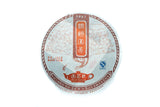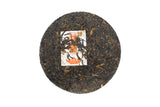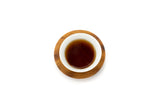yeeonteaco
Tea for Connoisseurs 1 Red Label Pu-erh Tea Cake 2007
The Original 1950s "Red Mark" (or Red Label) Pu-erh Tea Cake is known by tea connoisseurs around the world for having great "Cha Qi" and distinct camphor taste.
Due to the high asking price of the original '50s Red Mark (Red Label) tea cake. We've worked closely with our tea factory in Yunnan to create the "Tea for Connoisseurs 1 Red Label Pu-erh Tea Cake". This Pu-erh Tea Cake is a faithful replication of the famous "Red Mark" Pu-erh Tea Cake of the '50s. with all the sensory characteristics of the original at a much more attractive price.
The tea liquor is reddish-brown with an aromatic, brisk, light camphor wood, lightly astringent, and aged tea flavor.
The Tea For Connoisseur series (TFC) is created with the purpose of providing high-quality Pu-erh tea cake for tea enthusiasts with different characters. Most tea cake from this series is limited production single estate, broad leave arbor old tree and aged in our professional warehouse in Hong Kong. It is excellent value for collectors and tea enthusiast.

General Guide to brewing Pu-erh Tea
Steep Pu-erh tea in hot boiling water. The ratio of tea leaves to water is approximately 1:4 to 1:5. or 8 grams of tea to 125 ml. of water.
First steep for 5 to 10 sec and discard the water to clean and heat the tea leaves. Steep for 20 seconds, and lengthen the time for each subsequent infusion.
The number of infusion can range from 10 to 20 times.






